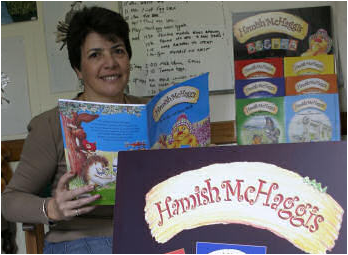As a children's writer I find it both exciting and terrifying, the way technology is changing so fast.

Children of the next generation will take for granted things we could hardly have imagined just ten years ago. In a world full of new technology, which sometimes appears to be taking over our lives, established concepts are constantly being challenged and the possibilities are endless.
In this ever-changing world one constant is the power of a great story, regardless of the marvels of technology and the many varied ways it can be delivered. From the darkest reaches of time humans have told stories, cave paintings depict tales of bravery and prowess, and folk tales through the ages have created and passed on myths and legends in every culture. It doesn't matter whether a story is accessed in the form of a paper book, ebook, film, stage play, game or spoken word; we look for the excitement, the reassurance and often the discovery that we are not alone or as different as we might feel. Stories are the way we make sense of the world, discover more about it and writers, particularly children's writers, have often used story to challenge perceptions and social mores. Whether fiction or non-fiction, as writers it is our job to communicate in a way that grabs our readers of whatever age and in whatever format they want and need. Instead of hiding under the covers at the thought of change, it is worth remembering that technology is just a tool. It is the quality of the writing that really matters, whether using pen and paper, computer or any other format.
Social media
Ours is a solitary business as most writers work alone. The internet allows us to do much of our research from our desks at the click of a mouse, but we can also connect with the outside world by joining communities of writers from all over the globe. Although it is a great way to network, social media can be a mixed blessing; uplifting and depressing in equal measures. Everyone likes to share success, so it can seem as if everyone else is having a wonderful time and becoming more and more successful, but in reality few want to admit so publicly to any failure. The other side is the support and encouragement from other children’s writers, which can be heart-warming on this emotional rollercoaster as we navigate the challenging world of publishing.
Often the biggest problem with social networking and blogging for a writer is lost writing time; the hours when you could be writing, that just disappear. If you like and enjoy it, social networking can work well for you and your books. Having a platform in the form of a website or blog and creating a rapport with your readers, or their parents, can build you a following which publishers will happily take into account when assessing the commercial potential of a book, although it is not likely to be a determining factor in any decision. Some writers spend a lot of time on social media communicating with friends and family or other writers, which though pleasant is not necessarily building an audience and might be time better used writing their next book.
The importance of libraries
Libraries are important places as far as children's writers and our readers are concerned. Librarians organise projects and reading challenges, as well as the school and library visits that often form a large part of a children's writer's income. Public Lending Right is another source of income for a writer, based on book loans, and with libraries now buying fewer and fewer books this impacts on both writers and publishers. Particularly under fire in the current climate, libraries are often undervalued by the powers that be, with many being closed completely and others becoming filled with computers at the expense of bookshelves. Budgets are being cut and librarians, both in public libraries and school libraries, often find themselves either job-sharing or lost in a cost-cutting exercise. For families, public libraries are a wonderful resource and the advent of ebooks is part of the change in technology that libraries are adapting to, but it may be a while before there is any hard evidence about how many 7–11 year-olds actually read on electronic devices rather than paperbacks, and how many young people want to borrow ebooks from public libraries. In schools a professionally trained librarian is a huge benefit as their often encyclopedic knowledge can put the right book in the hands of a particular child, sometimes the one book that will open the door and create a reader for life. Librarians also help writers keep in touch with our young audience. They organise events where children can meet writers and understand the passion that goes into creating the characters they enjoy reading about, and discover that we (writers), are real people. Technology may do many things but it cannot replace a dedicated, knowledgeable and enthusiastic librarian.
Linda Strachan is the author of over 60 books. She writes for a wide range of ages from picture books to edgy Young Adult novels – including the bestselling Hamish McHaggis series and award-winning Spider (Strident 2008), Dead Boy Talking (Strident 2010) and Don't Judge Me (Strident 2012). Her educational books are used in schools worldwide. She has also written a writing handbook for adults, Writing for Children (A&C Black 2008). Linda lives in Scotland and is the Chair of the Society of Authors in Scotland. She is an inspirational creative writing tutor and speaker, travelling widely at home and abroad presenting in schools, libraries, universities, conferences and festivals. Her website is www.lindastrachan.com.
This article is an extract from the Children’s Writers’ & Artists’ Yearbook. For much more from Linda on apps, ebooks, self-publishing ebooks and multiple platform publishing, as well as dozens more from other authors and industry professionals, purchase a copy here.
Comments